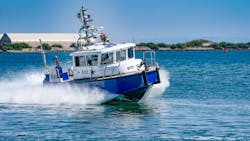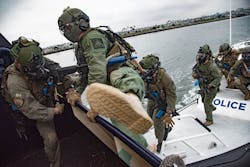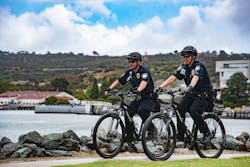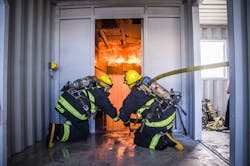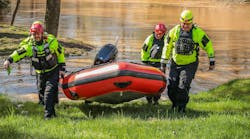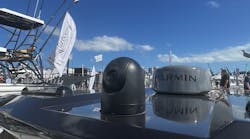Timothy De La Peña wasn’t an old salt. He hadn’t heard the sea calling growing up the way he had heard the call of law enforcement. De La Peña had fallen in love with becoming a police officer early, and he pursued it as a career.
This article appeared in the March/April issue of OFFICER Magazine. Click Here to subscribe to OFFICER Magazine.
When the dream of joining a department became a reality, though, it was with the San Diego Harbor Police Department, the primary law enforcement agency that patrols along the Port of San Diego and San Diego Bay. The land lubber was now going to be patrolling 38 miles of coastline as an officer and become immensely familiar with the sea.
“The whole thing is surreal,” De La Peña tells OFFICER Magazine. “I applied to the department and it was the first department I ever applied to. I figured I'd get somewhere in the process, and then it would end and then I'd have to apply to another department, because that's generally the way it goes. Uh-huh. I was lucky enough to get hired by the first department I applied to.“For me, I had no boating experience prior to being hired by the department,” he adds. “So I had to learn all that through the onboarding academy and through our on-the-job training.”
That was 18 years ago, and De La Peña hasn’t left the department. He’s a sergeant now, and he’s still in the career that he always felt he was meant to pursue.
“I couldn't have imagined any of it,” he says. “I was a detective for four years, on the FBI's Joint Terrorism Task Force. I'm currently the community policing sergeant. … I couldn't have imagined any of it. I just wanted to be a cop and help people out and have a good job and to do the right thing. And, you know, everything else is extra.”If De La Peña’s story sounds unusual, then maybe it’s appropriate that he works for such an unusual department. The Port of San Diego Harbor Police isn’t a division of the San Diego Police Department, and it isn’t connected to a city, county or other municipality. It’s 138 budgeted officers patrol the port and the bay, carrying out not only law enforcement duties but also providing marine firefighting service. With its vehicle patrol, the department handles most of the land calls along the waterfront, which is known as the Tidelands and stretches across five cities. And as if to complete the land-sea-and-air trifecta—sort of—the Harbor Police is the contracted police department for San Diego International Airport.
“The Port of San Diego Harbor Police is a niche police department,” says De La Peña. “I don't think there's anything quite like it—at least on the West Coast—that I'm aware of. I think perhaps the Port of Seattle Police come fairly close or maybe the Port of Long Beach (California), but it is very unique, with the airport and with the vessel stuff and with the uniform stuff.”
The diversity of coverage areas means a diversity of skills and duties for the officers. Although the Harbor Police is a specialized agency, most of its officers are anything but.“It provides a lot of variety as far as what your day looks like,” says De La Peña. “We work four (10-hour shifts). Over those four days of normal patrol rotation will be two days at the airport, one day in a patrol vehicle and then one day on the boat. That's your full four days right there. No one specializes in our department. We do have a few specialized teams, but as far as everything I've mentioned so far, everyone rotates through every week.”
Given the vast scope of all the duties, De La Peña says that if an officer doesn’t work a certain billet regularly, he or she could get rusty, but it reinforces the need to stay current on the different facets of the job. That’s rare, he says, crediting the training officers receive at the regional academy and with the department with preparing them for their roles.
The muscle memory can run so deep, in fact, that it wasn’t until De La Peña was running through the skill sets required of a Harbor Police officer that the sheer amount of knowledge hit him.
“As I listed off all that stuff to you, I did realize how much that was,” he says. “And I think over the course of my career … I've forgotten how much that you have to learn at the beginning, because it just becomes a habit. It just becomes one of those things that you couldn't forget if you tried. I think that's with all police officers or firefighters. You just have done it so many times that you're just going to you're never going to forget how to do that.”
When is a police officer a firefighter?
It’s telling that De La Peña mentioned firefighters. Officers receive six to weeks of additional training that includes maritime firefighting—”basically fighting fires on a boat,” he says—and it can be a significant part of the job.
“Our vessels are set up as basically floating fire engines, and we use them to put out boats that catch on fire,” he says. “We're all familiar with the great rivalry between law enforcement and the fire department. That's one thing that hasn't changed in my 18 years of law enforcement, but I would never call myself a firefighter. I'm not a firefighter. I am a police officer that has been trained to do a little bit of firefighting. That's my personal characterization.
“But after going through that training, I do have more respect for my colleagues at the fire department. And I will say that it is very different than law enforcement. Law enforcement is focused on dealing with people, for the most part, resolving conflicts if you can or taking enforcement. Firefighting … if you're actually going to a fire, is dealing with a force of nature. There's no de-escalating a fire. A fire is just a fire. It's going to do what it's going to do”
The first fire response De La Peña was a part of also happened to be the largest fire the Harbor Police had seen at the time.
“We've had some bigger ones since, but up until then, that was the biggest one,” he says. “There were five sailing vessels that caught on fire. There was one that had an electrical issue that sparked it, and we ended up being there as a two-alarm fire with the city fire department and other agencies.
“Trying to put that out, that was crazy, and I certainly didn't think I would be doing that when I was in the police academy. I knew that the harbor police fought fires, but that was a legitimate big, big fire. I know other officers on the department have had experiences like that, and in the next day after the fire, you were in a patrol car responding to calls for service.”
Another massive blaze the Harbor Police helped battle also shined a national spotlight on the department. On July 12, 2020, an explosion erupted in the lower part of the USS Bonhomme Richard amphibious assault ship, which was undergoing maintenance at its home port at Naval Base San Diego. A fire raged on the vessel for five days and injured 63 sailors and civilians.
“In the first video, you see a boat spraying water onto the side of the ship to cool it down,” he says. “That's our Harbor Police fire vessel helping out until the Navy got their firefighting equipment on their tugs down there to do that. And it's just one of those things, our boat is next to this gigantic Navy ship with smoke pouring, and we're doing what we can to help out the Navy as much as we can to help them with their situation. And it's just random things like that, you know, that you never think will happen or that you couldn't imagine happening and that you're into and you're doing it.”
‘We work in a beautiful place’
The Bonhomme Richard is an example of how much the Harbor Police must work with other agencies on an almost daily basis. Along with Naval Base San Diego, San Diego Bay is home to three other Naval facilities: Naval Station San Diego, Naval Amphibious Base Coronado and Naval Base Point Loma at Ballast Point, which is a nuclear submarine base.
“Officers—and supervisors, especially— have to know who has responsibility for what things around the bay and then how we're going to deal with those,” De La Peña says. “We work with the Coast Guard a lot, obviously. There's also a Coast Guard base on San Diego Bay. We work with them a lot on the water. Occasionally, we'll work with Navy security.
“If we have a vessel that catches fire in a marina or on the bay, we're working with the local fire departments, depending on which city we're in, because the water five different cities, and that goes for the municipal police departments as well. We have to liaise with a bunch of different departments because we share jurisdictions with all of them. … And I haven't even mentioned that we also have to deal with the TSA and have to be aware of FAA regulations that regulate the airport, in addition to all the normal law enforcement stuff that you have.”
Add to that San Diego’s healthy tourist trade. The city is the destination for cruise ships and international flights, and attractions and landmarks like the area’s beaches, Legoland and even filming locations from the Top Gun movies—the former Naval Air Station Miramar had been the site of the U.S. Navy Fighter Weapons School until 1996 and is now Marine Corps Air Station Miramar—are large draws. The dynamic surroundings and duties give the Harbor Police a large department feel without completely jettisoning some of the benefits of a smaller force, says De La Peña.
“I do like that because we are a specialized department and we are a smaller department that that lends more of an the atmosphere that you get from a small- to medium-size police agency,” he says. “It's more of a family. Everyone knows everyone else, and we all have this unique skill set, and it kind of sets you apart.”
“It's it is a very unique department,” he adds. “We work in a beautiful area. And sometimes, you forget because it's just where you work, you get used to it. But every once in a while, I’ll take a look and I'll be like, ‘Wow, we really do work in a beautiful place. There's no other way to say it but that way. There are worse places to have to go to work for sure. So, you know what? If you're going to be an officer, why not in San Diego?”
